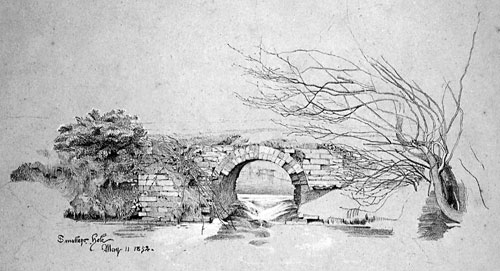 |
Smokers Hole 11th May 1852 Drawing by Frederick Sandys now held in Museum of Fine Arts, Boston, USA |
Hempstead Hall Wademill Mill River Glaven |
what3words location - ///lizards.beginning.intro |
 |
Smokers Hole 11th May 1852 Drawing by Frederick Sandys now held in Museum of Fine Arts, Boston, USA |
Hempstead Hall Wade Mill is one of the lost mills of Norfolk and has completely disappeared except for some traces of brickwork. However, it was once there in a place known as Smokers Hole, a smugglers' haunt and the two semi-detached single storey cottages next to it were called Mill Cottages. One was inhabited during the 1930s and early 1940s by the legendary character known as Long Sal. Sadly, the cottages have also disappeared save for some low walls of brick and flintwork. Earlier maps show the cottages as Mill House, which could easily have been split into two cottages at a later date. |
In the 12th century Simon de Hempstede, who became Lord of the Manor in 1182, granted additional water rights to the monks of Binham Priory, in the form of the water between Hempstead and Edgefield in order... |
In the said year (1303) Sir Robert de Hengham bought of William de Ormesby, and Agnes his wife, a mill, with the pool in Hemstede, with several villains, rents and services, William and Agnes, and the heirs of Agnes, to have the liberty of first grinding therein, but not to erect any mill here. |
In 1796 Mary Woods sold Brownwood Farm of Hempstead to William Johnson of Cley and the sale description of the land includes the phrase 'a way leading from Plumstead towards Brent Mill.' However, that is the only known reference to Brent Mill. |
The original watercourse was altered to the east for several hundred yards above the mill, in order to provide a deeper dam and a better head of water for the mill. Parish boundaries frequently follow the exact paths of ancient watercourses and it can be seen that Hempstead's boundary with Edgefield follows the original Glaven watercourse on the west side of the mill. |
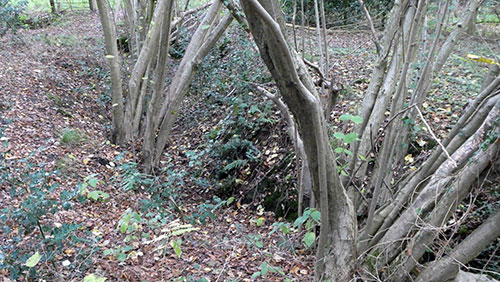 |
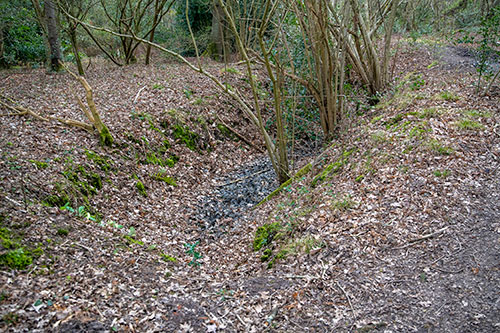 |
Original course of the river just downstream from the mill site - 11th November 2017 |
Original course of the river opposite the mill site - 21st March 2020 |
A few hundred yards above the mill, the river flow was controlled by a sluice during at least the first half of the 1900s. Here also, according to local historian David Reynolds, stood Packhorse Bridge that crossed the river near the parish boundary with Holt and linked to a causeway running up into Holt Lowes. |
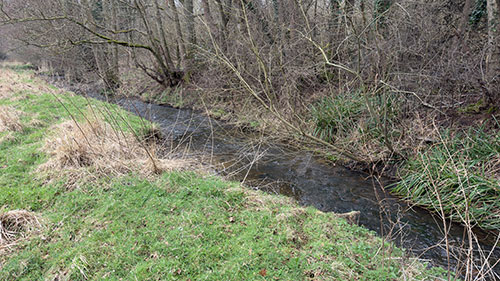 |
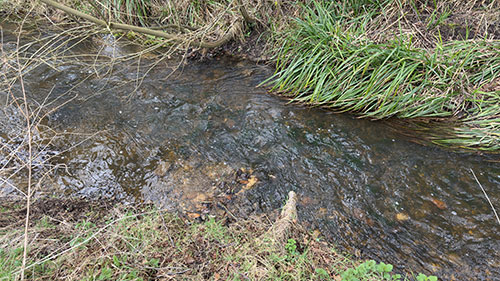 |
Brick remains at the sluice site of Packhorse Bridge - 7th March 2024
|
|
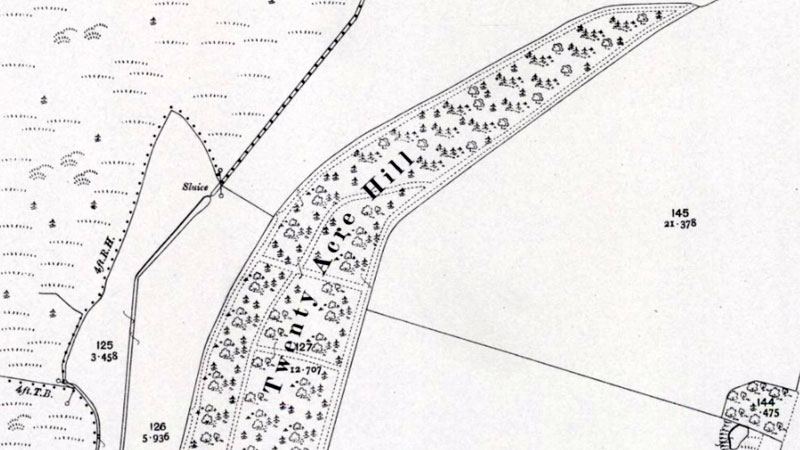 |
O. S. Map 1905 River Glaven sluice above the mill with Packhorse Bridge just to its north in line with the parish boundary. The original course of the Glaven following the parish boundary can be seen to the west of the present and straighter course Courtesy of NLS map images |
Smokers Hole, according to local historian Jane Hales, referred to a depot or rendezvous used by smugglers in the process of moving their contraband inland as fast as possible. In William Newman's book of 1728, three buildings are shown on the site, one of which could well have been a barn. |
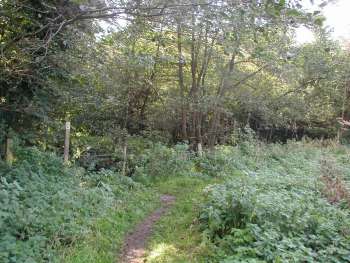 |
Path to the mill - 29th September 2002 |
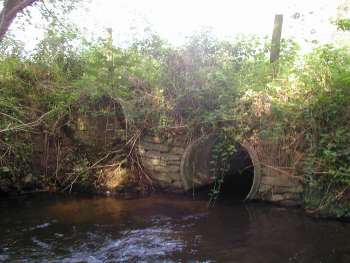 |
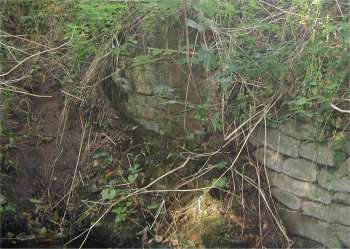 |
29th September 2002 |
The old brickwork is on the left |
The road from Hempstead to Edgefield passes through Pond Hills. It is partly a field road and as it winds through the wood is one of the most picturesque in the county. In the wood is a pond from which a stream flows into the Glaven forming the second tributary. Just below the junction there was until recently a mill house, which was the site of a watermill. The causeway which formed the mill dam still exists. This is probably the mill referred to in a grant by Simon of Hemsted to the monks of Binham Priory of the water between Hempstead and Edgefield to better the monks' mill... |
 |
 |
29th September 2002 |
The old brickwork is on the left |
Prior to moving to Hempstead_Mill in 1911, a Mrs. Newall was living at the Hempstead Hall Mill Cottages (Smokers Hole). When required, the miller at Hempstead_Mill would carry a large bag of flour down through the woods to where Mrs. Newall and her family lived. He had a resting post on the side of the track about half way down. |
During the 1930s and up until the early part of the second world war, the cottages were inhabited by the legendary character known as Long Sal. The army then used the area for practising working with incendiary bombs and the site became unsafe due unexploded devices, one of which was found in 2008. After the war the cottages gradually became derelict and eventually collapsed. |
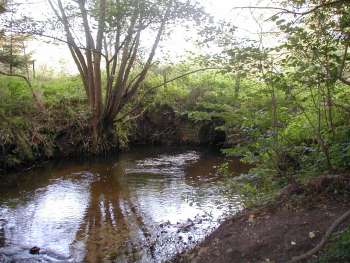 |
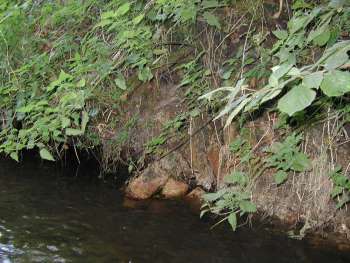 |
29th September 2002 |
More old brickwork on the nearside bank |
Recent surface scraping with farm machinery revealed brick foundations of the mill next to the watercourse. The site and most of the village once belonged to the Gurney family, who then sold the estate to George Knight in 1945, who later sold the area around the mill to Richard Henry Mack and his son Henry Mack on 6th April 1946. |
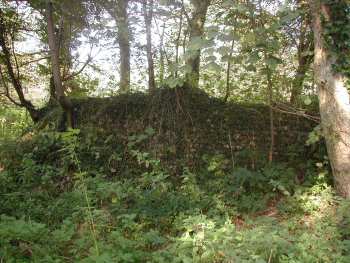 |
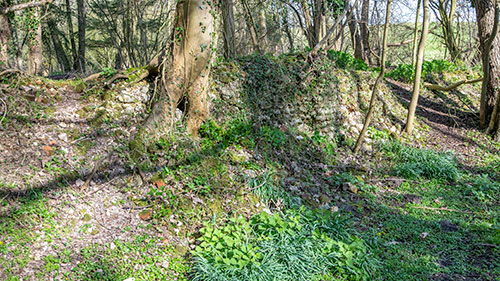 |
One remaining wall of the Mill Cottages -
29th Sept 2002 |
21st March 2020 |
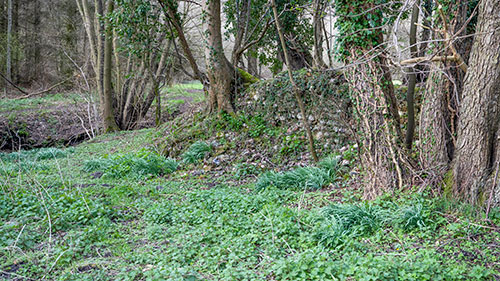 |
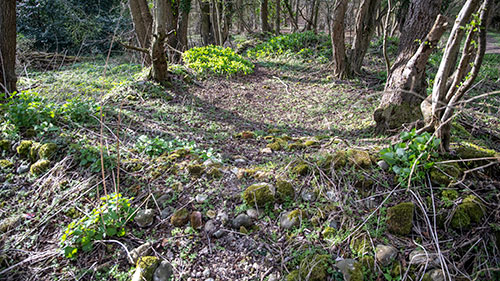 |
Cottages wall with river beyond - 21st March 2020 |
Mill House - later two cottages, interior - 21st March 2020 |
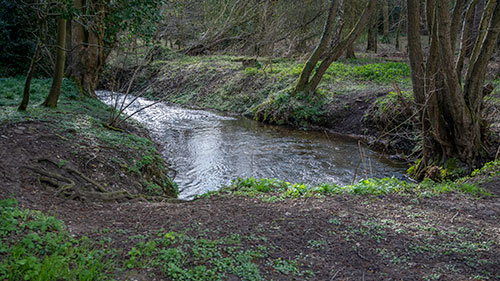 |
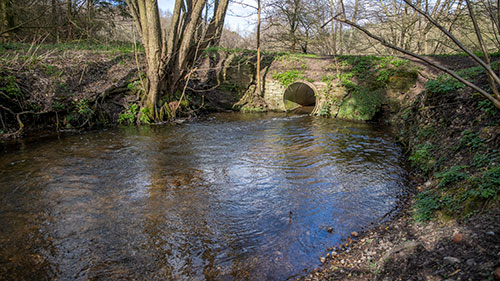 |
Mill race - 21st March 2020 |
Mill remains - 21st March 2020 |
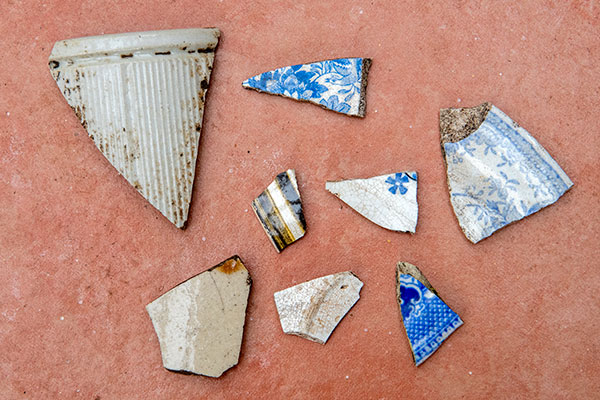 |
Pottery remains found on site - 29th March 2020 |
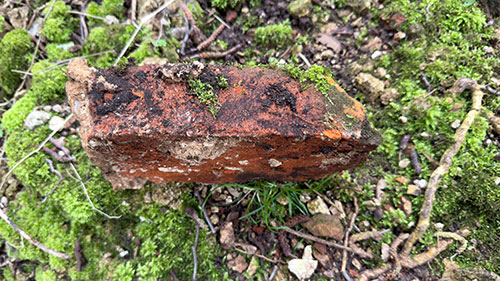 |
Old two inch brick as part of Mill Cottages - 7th March 2024 |
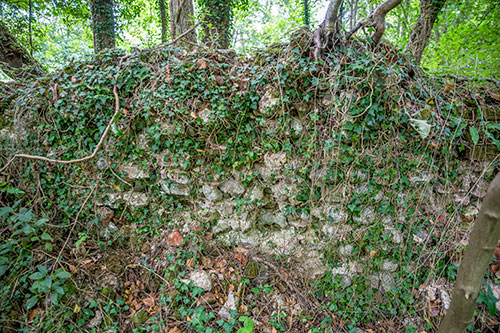 |
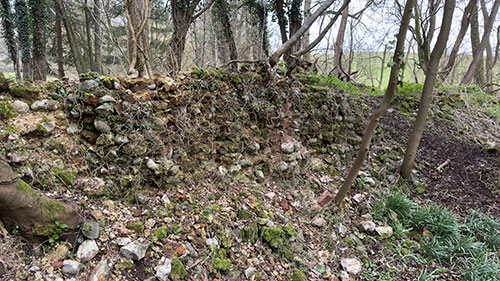 |
Mill Cottage south wall remains - 24th July 2020 |
Mill Cottage south wall remains - 7th March 2024 |
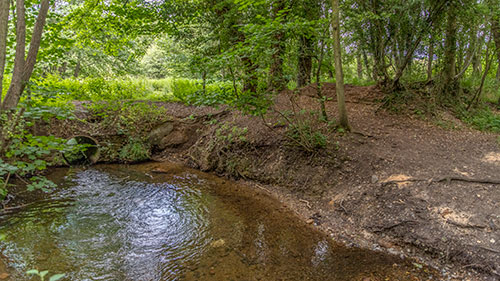 |
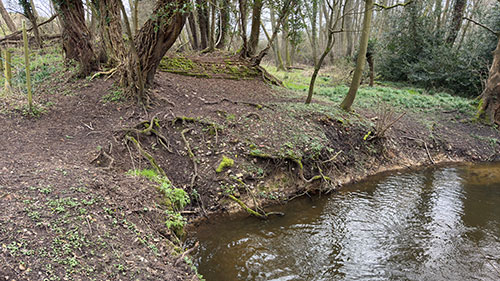 |
Smokers Hole - River Glaven and gable end of Mill Cottages - 24th July 2020 |
Gable end remains of Mill Cottages - 7th March 2024 |
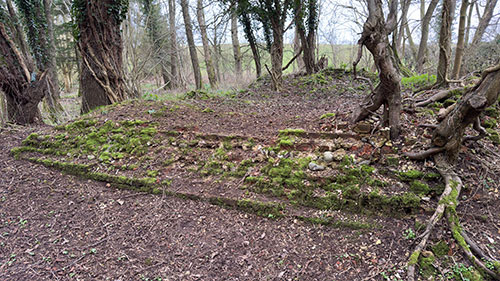 |
Gable end remains of Mill Cottages - 7th March 2024 |
I was fascinated to find your web site! My mother (92) and I have just returned to Cornwall from Norfolk. Our main reason for the visit was to visit Edgefield and Hempstead, where her father's family came from. On the 1871 and 1881 census returns her 2x Gt Grandfather, James Wright, was listed as living at Smoakers Hole. Earlier census returns list the family, but no dwelling place. We found the ruins, she was very moved to stand in them, it is a beautiful place. John Wright married a Mary Bacon, from Edgefield. I attach a piece of doggerel verse writen by Mary's brother in law which might amuse you. I don't know when it was written. I spent too few hours in the Norfolk Record Office, sadly I live in Cornwall, so don't know when I'll be able to visit it again, but I will! I would be very interested in any more information you could give me about Smoakers Hole and the families that lived there. |
Good Friday Then Sarah the little one nursing the baby so good Jenny has just reminded me to say |
There was a medieval mill at Dam Hills on the Glaven which Faden called “Hempstead Beck'', but which does not appear on his 1797 map, (Curiously he does show a pond on the river to the north of Red House Farm which does not relate to any of the subsequently created bodies of water). In the l2th Century Simon de Hempstede had granted additional water rights to the monks of Binham Priory. The 1837 OS map showed the “Mill house”. The dam wall can still be seen. The remains of the Mill House remained until recent times and were referred to as “Smokers Hole'' where lived a legendary character up to the 1939/45 war called Long Sal (see Jane Hales: “Looking at Norfolk''). It seems certain that what is now sometimes wrongly called “Hempstead_Mill'' on the Holt road is of no great age. Indeed Basil Cozens-Hardy confirms that it was the much earlier mill at Smokers Hole which is “the mill referred to in a grant by Simon of Hempstede to the monks of Binham Priory of the water between Hempstead and Edgefield “to better the monks' mill”. (Simon had become Lord of the Manor in 1182). |
In February 1777, two riding officers, assisted by some dragoons, seized 70 half-ankers of brandy and geneva in Hempstead Field. |
I have recently moved from Essex to Gissing, abour 5 miles north of Diss in Norfolk, having taken a job in Long Stratton. It prompted me to research my ancestry further back than my Great Grandmother, Ida May Jackson (B: 13 Nov 1886 Hunworth) . Her mother was Juile Anna Jackson, who was working as a servant in Hunworth in 1886 and married James Gotts a couple of years later. I have now traced my roots back to Samuel Jackson and Hannah Jacobs ( my great, great, great grandparents). Samuel was a shepherd and they lived at Smokers Hole in Hempstead in 1891, according to the census. All three generations spent their entire lives around the Erpingham area. They also ran the White Horse Public House in Ramsgate Street, Edgefield, in 1871. |
'Long Sal' of Jane Hales fame was my father's maternal grandmother. Her name was Sarah Dagless, née Hubbard. She was married to James Dagless. We do not know quite when they moved from Edgefield to live in one of the Smokers' Hole cottages. My father often described the Sunday afternoon family visits there which took place when he was a child in the thirties. |
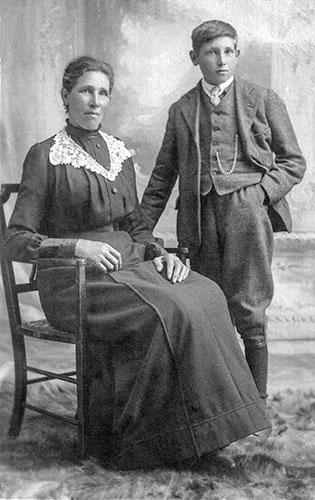 |
Sarah Ann Dagless with her son at a studio in Sheringham - c.1912 |
My husband's grandmother was born Emily Mary Dagless in Erpingham (1895 - 1982) her mother was Sarah Ann Hubbard (1868 - 1956) she married James Dagless from Saxthorpe. My husband can remember his great-grandmother as being very tall. |
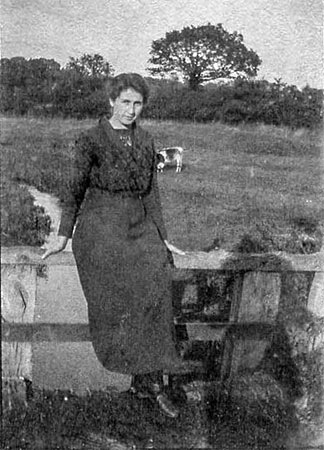 |
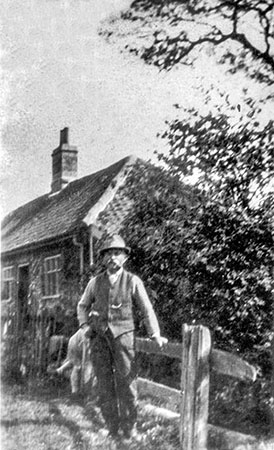 |
James and Sarah's daughter, Emily Mary Smith at Smokers Hole - c.1930 |
James Dagless outside the Mill Cottages at Smokers Hole - c.1932 |
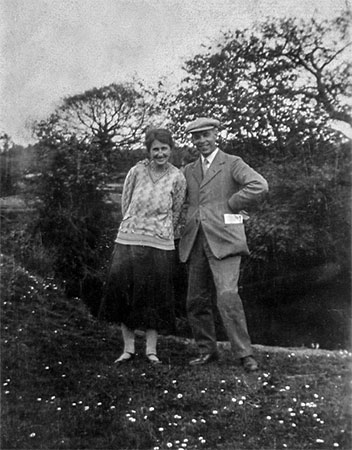 |
Emily Mary Smith (Long Sal's daughter) with husband Walter Smith at Smokers Hole - c.1932 |
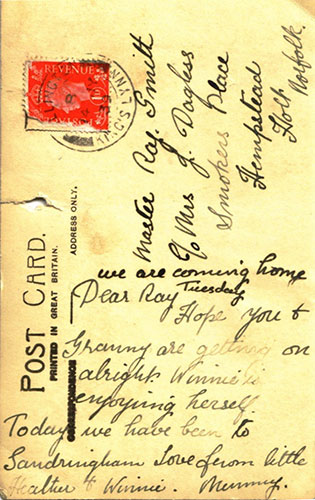 |
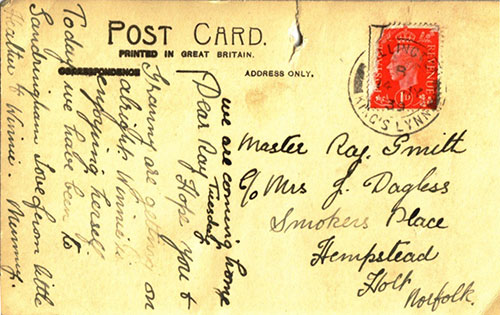 |
Postcard sent by Emily Mary Smith (née Dagless) to her son Ray (James) at Smokers 'Place' - 14th May 1939 |
|
My late Granny, May Ellis lived nearby at Valley Farm. I was always told Long Sally was very tall and regularly drove her horse and cart along the lane (now a muddy path) up to the Norwich Road. Her house at Smokers Hole got taken over by the army in WWll and was used for target practice. |
The area around Smokers Hole was effectively part of the River Glaven flood plain and could become very wet at times, especially when the mill dam was full in winter. It was quite possibly the monks during the 1100s or thereabouts that were responsible for building the substantial and stone paved track that connected their mill to the Holt - Baconsthorpe Road. Twenty Acre Hill is quite steep and the track was cut into its lower side as it ran parallel to the Glaven before turning to the northeast and up the slope to join the road. A flint wall was also constructed on the western side along part of the length, presumably as a barrier in times of flood and also to contain cattle in drier times. Twenty Acre Hill was later planted with trees and the track is now just inside the wooded area but still clearly visible. |
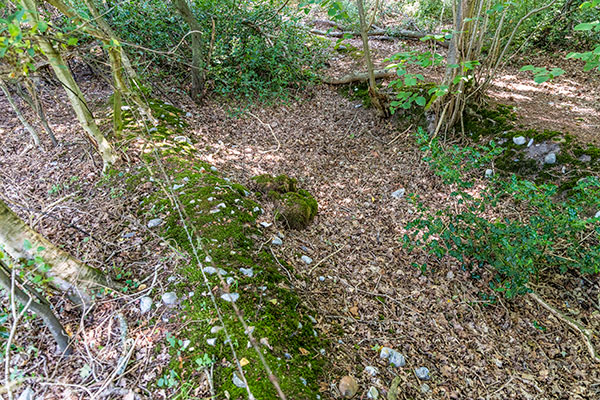 |
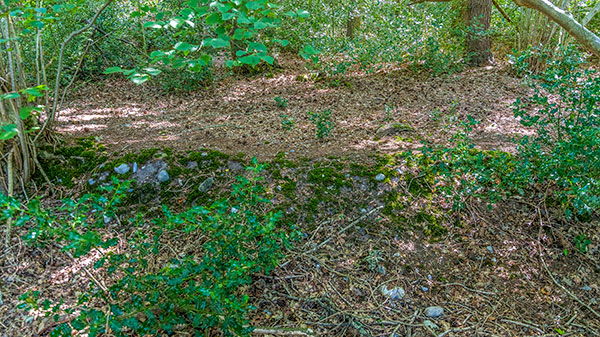 |
The track wall with the later barbed wire fence line is in the forground with the paved track running parallel and a drainage area between - 3rd August 2020 |
The substantial track cut into the hill clearly visible - 3rd August 2020 |
In order to access Hempstead Hall Farm, which probably supplied the mill with corn, another track was constructed that cut through the hill leaving a small southern hill area that became known as Split Hills. The track through what is now the wooded area is steep and any horse with a cart would have had a difficult time in either direction. Once up the hill and onto Mill House Lane, the track immediately levelled out before going down the more gentle slope to the Hall. |
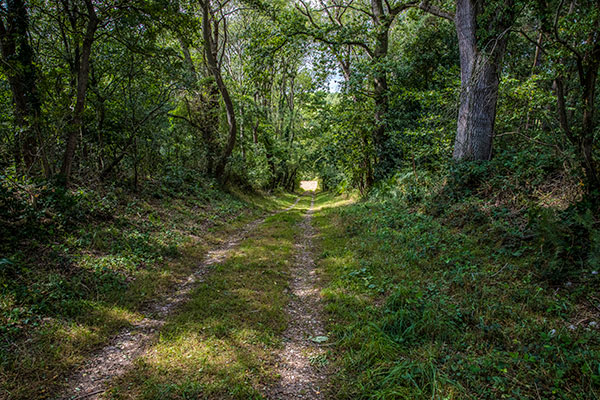 |
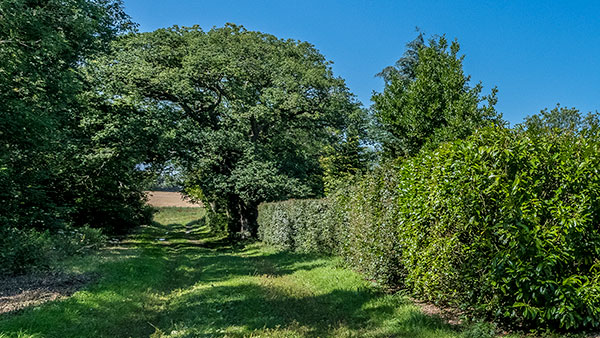 |
Mill House Lane running through the wood just above and looking towards Smokers Hole track 22nd August 2020 |
Clamp Lane running beside Church Farm, looking towards Smokers Hole - 31st July 2020 |
My Mum said the house wasn't destroyed by the army - it just fell down soon after the war. It was a wonder Long Sally wasn't killed though as she just drove her pony very close to the firing. Teddy Jones lived there after Long Sally. |
There was an old water mill situated up stream from Edgefield bridge on the river Glaven. This was on the old road between Holt Edgefield and Hempstead and our playground, known as long Sallys, Long Sally was very tall and also my fathers aunt. Sally was often seen with a donkey and cart. |
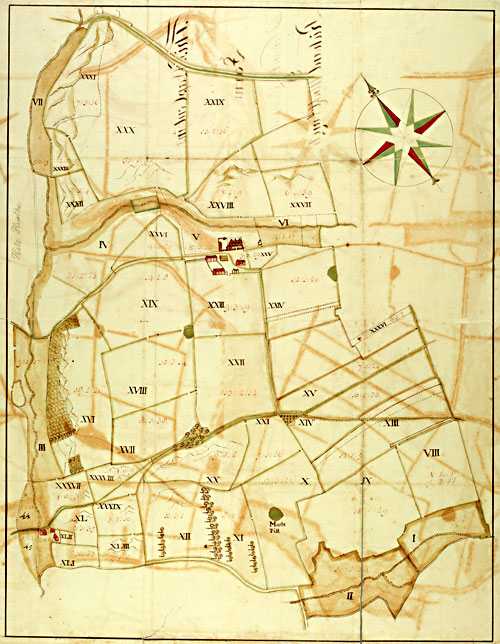 |
Hempstead Hall estate map by James Corbridge - 1726 Hempstead Hall watermill site bottom left |
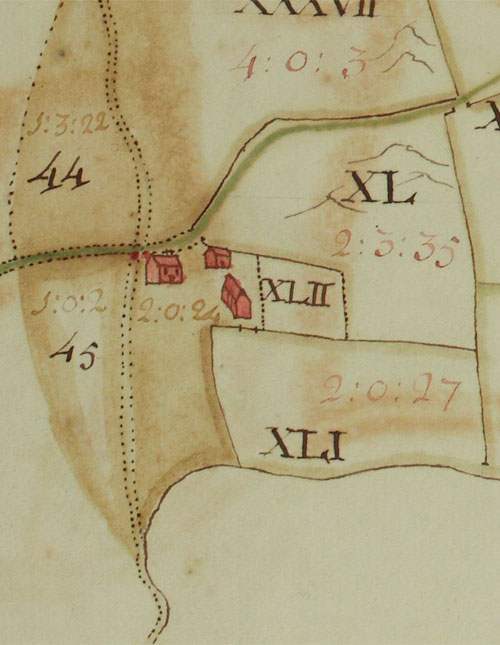 |
Enlarged section of above map - 1726 Hempstead Hall watermill site - Mill Farm |
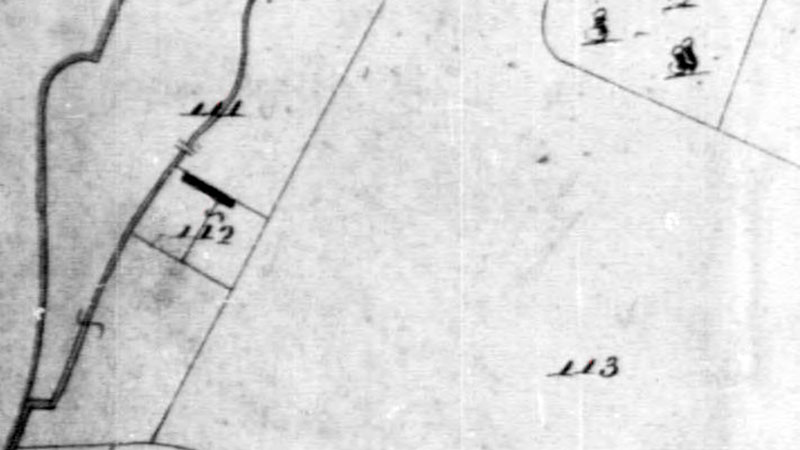 |
Tithe Map - 10th September 1839 Two semi-detached single storey cottages with gardens |
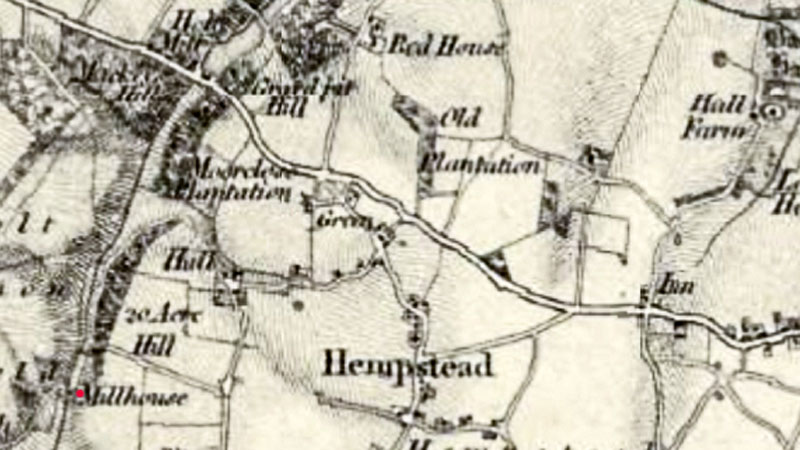 |
O. S. Map 1831 Millhouse marked in red |
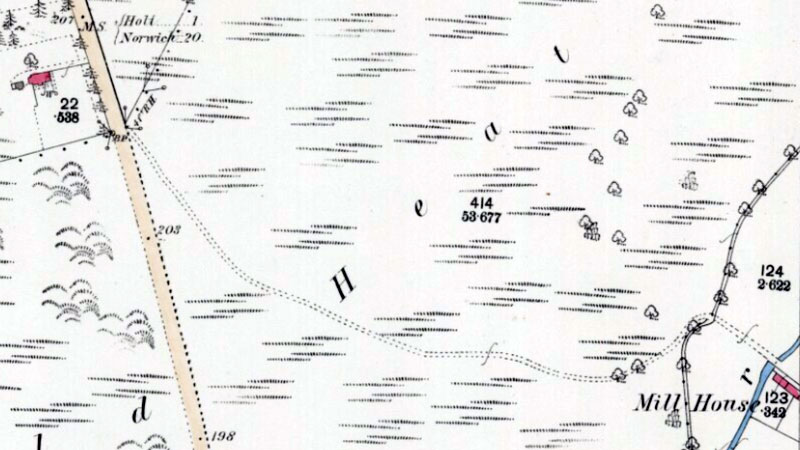 |
O. S. Map 1885 showing the track leading from Smokers Hole, up the steep hill to the Holt Road Courtesy of NLS map images |
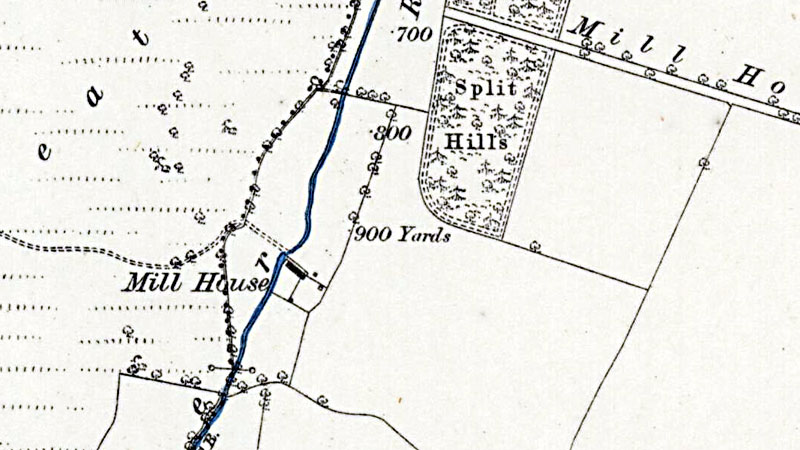 |
O. S. Map 1886 Mill House Lane leading from Hempstead Hall to the mill The original course of the Glaven following the parish boundary can be seen to the west of the present and straighter course Courtesy of NLS map images |
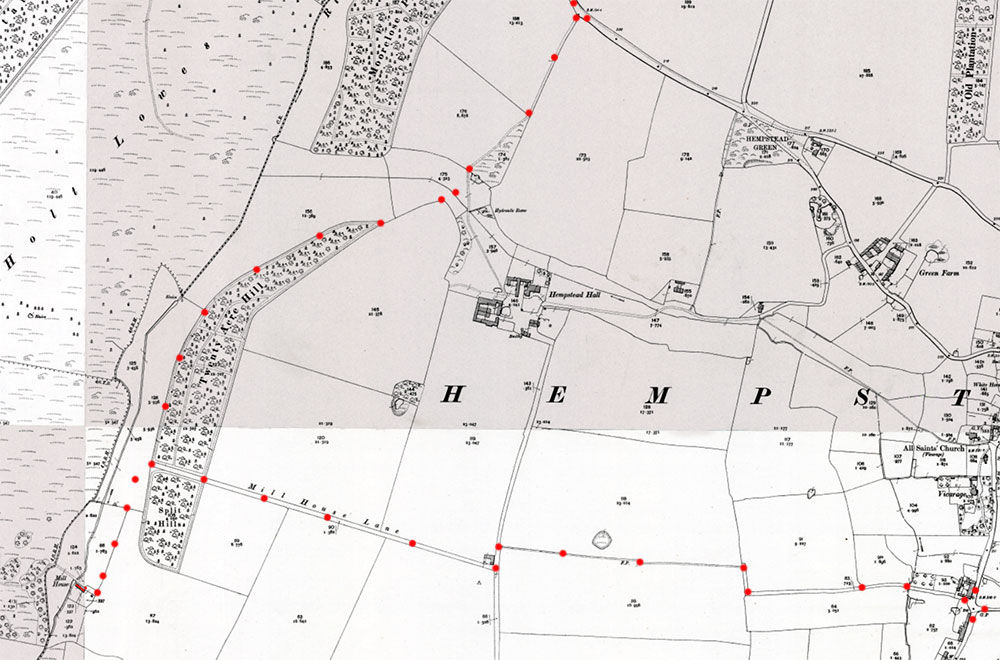 |
O. S. Map 1905 showing the tracks leading from Smokers Hole, up to the Baconsthorpe Road and also across to Hempstead village Courtesy of NLS map images |
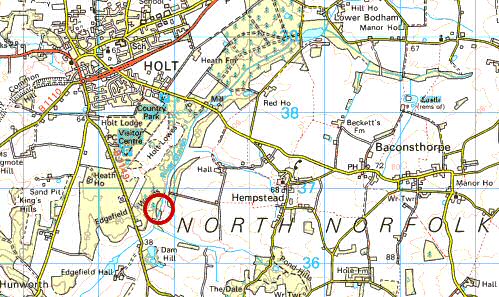 |
1182: Simon de Hempstede, granted additional water rights to Binham Priory to better the monks' mill.
Hempstead Hall Estate map 1726: Mill Farm - house, cottage and barn
1910: Mrs. Newall & family, Smokers Hole |
If you have any memories, anecdotes or photos please let us know and we may be able to use them to update the site. By all means telephone 07836 675369 or
|
| Nat Grid Ref TG 08793669 | Copyright © Jonathan Neville 2003 |